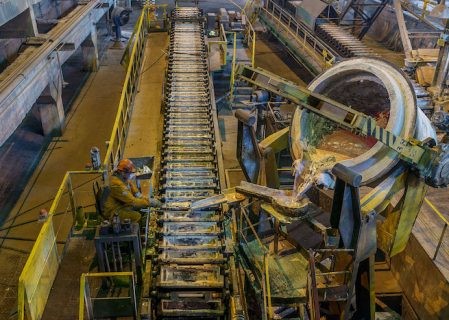您想继续阅读英文文章还
是切换到中文?
是切换到中文?

THINK ALUMINIUM THINK AL CIRCLE

Rusal has announced today, on July 24, that it has completed the project of converting its Krasnoyarsk Aluminium Smelter to the EcoSoderberg technology. The recently completed retrofitting project, which required an expenditure of US$ 74 million, involved modifying a total of 1954 reduction cells to use the EcoSoderberg technology. Between 2004 and 2019, Krasnoyarsk Aluminium Smelter allocated over US$ 390 million in total towards the implementation of various modernisation projects.

The EcoSoderberg technology was developed by the Engineering and Technology Centre of Rusal. It is recognised as the best available technology in the aluminium production section by Rosstandard. Experts say that the EcoSoderberg process is one of the most efficient and environmentally-friendly production processes in the aluminium industry to data.
The process uses an improved design of the exhaust fume removal system which ensures high degree of hermetic sealing and an optimised anode paste composition, resulting in a significant reduction of emissions, particularly of tarry materials. In the last 16-years, since the comprehensive environmental programme at Krasnoyarsk Aluminium Smelter started, the total emissions at the plant are reduced by 38 per cent, while fluoride emissions are down by 76 per cent.
The chairman of the Krasnoyarsk territory’s government Yuri Lapshin and the minister of the environment and rational use of resources Pavel Korchashkin paid a visit to the smelter after the transition to the new environmentally-friendly process was completed.
“The introduction of the EcoSoderberg process is a key part of the Company's modernization program. At the moment, in addition to KrAZ, the process is being introduced at RUSAL's other smelters, such as BrAZ, IrkAZ, NkAZ and VgAZ. In total, we plan for 400 reduction cells across five smelters to changeover to the new process this year. A new system of gas treatment has improved hermetic sealing of the cells, allowing us to effectively catch more than 99% of fluorides, 99.5% of benz (a) pyrene, and at least 96.5% of sulphur oxide. The next stage of our retrofitting efforts will involve deployment of inert anode reduction cells,” noted RUSAL CEO Evgenii Nikitin.
The comprehensive environmental programme at Krasnoyarsk Aluminium Smelter involved two stages. The first stage focused on the smelter building, commissioning new gas treatment systems, installing an automated production process management system, and introducing the dry anode process, while the second stage was all about introducing the best available technologies including the modification of KrAZ reduction cells to utilise the EcoSoderberg process.
Responses








